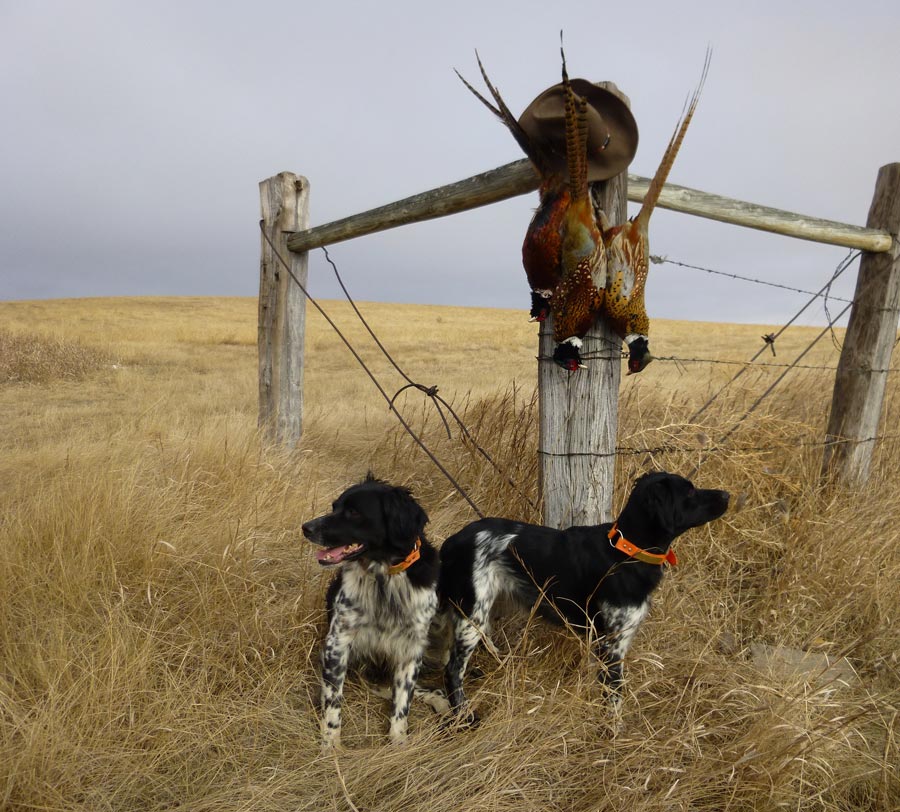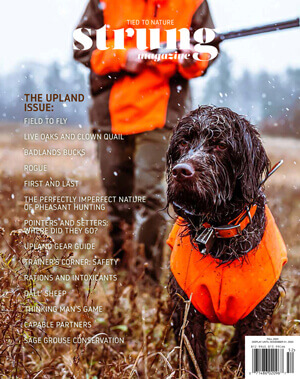by Tom Keer
When it comes to pulling out my wallet for a pup, my greenbacks go towards performance cover dog setters. A while back I’d been thinking about getting a pointer, and I still am. As a hardcore setter man, I knew I’d catch some grief. To determine the blowback, I dropped a bombshell of a joke on Peter, a hunting buddy. Like me, he loves all bird dogs—but he’s a pointer man.
“Hey, Peter,” I said. “I’m thinking about getting a pointer.”
“You?” he asked.
“Yup. I think it’s important to have an English pointer in my kennel.”
“Because they find all of the birds?”
“No. To keep the fleas off of my setters.”
I learned two truths. The first is that the joke applies to any two breeds. And the second is that 20 years later my jaw still clicks when I chew a piece of steak.
But Peter and I share a common bond that goes well beyond upland pointing dogs. We both like breeds that used to be popular but have fallen from favor. In 2019, the American Kennel Club (AKC) ranked the English setter as a middling 98 in a list of 193 breeds. The pointer came in a tad lower at 115. That’s a freefall from both dogs’ former positions in the top 5. Which was over a century ago, between 1900-1910. Yikes.
The setters’ and pointers’ lack of popularity isn’t a newsflash to me or my wife Angela. When we cut our setter loose, the over-50 crowd immediately recognizes our breed. We commonly hear, “I haven’t seen an English setter in years and had one as a child.” The under-50 crowd, by contrast, offers up, “What nice spaniels you have! Are they springers or Brittanys?” Angela fields those questions, as she is far more polite than I am.
No one blinks an eye when I say my first bird dog arrived in 1972 and was an Irish setter. The Irish setter’s popularity soared in the early ‘60s, with the AKC registering about a 1500 percent increase from 4,000 pups per year to over 60,000. Those dramatic numbers moved the Irish setter from a respectable 27th place on the AKC list to a whopping 3rd. But there was a hitch, one that made me cuss at a young age: Outcrossing was largely ignored in favor of line breeding from show stock. The goal was noble, with a focus on carrying forward the breed’s best qualities. But those lines became way too tight, and the result was painful. The stunningly gorgeous dogs were all show and no go.
By 1974, the breed’s focus, drive, and attention spans had weakened so much that a crash began. The fall from grace didn’t take long, and by 1986 Irish setter registrations dropped 95 percent to just over 3,000 pups. These days, selective breeding programs have returned the Irish setter to its former glory, and the breed currently ranks as the 77th most popular breed.
My breed myopia began with my next pup—for after a decade of frustration I switched to English setters. I have remained loyal ever since.
Breed Popularity and Trend Analysis
 Dr. Hal Herzog, Professor Emeritus of Psychology at Western Carolina University, is one of the world’s leading anthrozoologists, which is the study of human–non-human interaction. Part of his research focuses on the impact of pets on human health and well-being, and that course of study leads to trend analyses. Herzog confirms that, like almost everything else, dogs can be trendy.
Dr. Hal Herzog, Professor Emeritus of Psychology at Western Carolina University, is one of the world’s leading anthrozoologists, which is the study of human–non-human interaction. Part of his research focuses on the impact of pets on human health and well-being, and that course of study leads to trend analyses. Herzog confirms that, like almost everything else, dogs can be trendy.
In some cases, movies and books cause a breed’s increase in popularity. In 1962 the Disney film Big Red, about a bird hunter and his Irish setter, made the breed a household name. Old Yeller’s eponymous dog may have been a cur, but in the movie the character was played by a yellow Lab/mastiff mix. Again, yellow Lab numbers swelled. 101 Dalmatians made spotted dogs famous; Lassie led to a collie boom. High-profile celebrities affect breed popularity as well. Paris Hilton created a run on Chihuahuas, and her little dog landed on the cover of Modern Dog magazine. The cover story noted that her pup lived in a $325,000, two-story doghouse.
Dog registries are one way to chart breed popularity. The AKC, founded in 1876, is one organization dedicated to breed registration. The United Kennel Club (UKC), founded in 1898, is another. UKC focuses much of its attention on hunting dogs, with registrations coming from all 50 American states and 25 countries. The Field Dog Stud Book is the oldest purebred registry and dates back to 1874. Beyond the big three are other clubs and registries such as the American Purebred Registry, the American Canine Association, the North American Purebred Registry, and many more. With so many different registries it’s difficult to scientifically prove one specific trend. As numbers increase in one registry, they may decrease in another. Add to this the fact that some breeders don’t maintain accurate records and others don’t register at all, and the study of breed popularity becomes even more difficult.
Brett Volmert, Pro Development Manager for Eukanuba Sporting Dog, reports that bird doggers are increasingly turning to nontraditional choices: German Shorthaired Pointers, Vizlas, Griffons, Spinones, and Wirehaired Pointing Griffons, as well as flushing breeds like English Field cockers and springers and pointing Labrador retrievers. In waterfowling, traditionally dominated by Labs and Chessies, versatile dog breeds like Shorthairs and Griffons are also enjoying newfound attention.
Volmert attributes the shift away from “single-purpose specialists towards all-purpose dogs” to a number of factors. In the past, he says, owners often had “a pointer or setter for upland hunting and a Lab for waterfowling”—each one time-consuming and expensive to train and maintain. Versatile dogs—good at waterfowling, upland hunting, and hunt tests—are also often biddable and therefore excellent companion pets at home. Hunting families that also enjoy outdoor activities like hiking, trail running, or water sports are pleased with versatile dogs.
“Versatile dogs are better than ever,” continues Volmert. “They are intelligent and have good bird smarts as well as excellent conformation and stamina. If you like to hunt ducks in the morning, hunt birds in the afternoon, and then have a family dog curl up next to your kids on the couch in the evening, then a versatile dog represents a good choice.”
Many new upland bird hunters and waterfowlers fall into the “hipster” demographic: They have grown up with technology, favor alternative lifestyles, and are heavy social-media users. In general, hipsters are nonconformists—or perhaps we may say that they conform to nonconformity—which may explain the hipster interest in versatile dog breeds like Drahthaars, German Shorthaired Pointers, Wirehaired Pointing Griffons, and Munsterlanders. The North American Versatile Hunting Dog Association (NAVHDA) recognizes 30 different breeds, which means that young hunters can find a breed that reflects their hunting style and game of interest. They’re also able to differentiate themselves from older bird doggers who run pointers and setters.
UKC Vice President Todd Kellam, himself a hunting dog enthusiast for 47 years, suggests that technology helps fuel the uptick in the popularity of versatile breeds because research on even obscure breeds is just a click away on the Internet. “The Braque Francais, Pudelpointer, and Munsterlander are more prevalent than ever before,” he says.
Over the past two decades two versatile rising stars are the Epagneul Breton and the Boykin Spaniel. “The Bretons,” says Kellam, “excel at both pointing dog field trials and hunt tests. Boykins are so well represented at the UKC/Hunting Retriever Club Grand Hunts,” continues Kellam, “they are now surpassing Chessies and are quickly closing in on the number of Golden Retrievers. Ironically (or maybe not) both of these up-and-coming breeds are talented, big-hearted hunting dogs in a small package.”
Semper Fi
For half a century, retired Marine Corps Capt. Bob Priest, nobody’s idea of a hipster, stayed true to English setters and pointers for grouse and woodcock hunting and Labs for waterfowl. Last year he switched to a versatile Spinone. Why? “My hunting style changed as I aged,” Priest explains. “Running through heavy grouse cover, stepping over logs, bending under conifers, and mucking through swamp bogs is for younger men. At my age I walk carefully, cautiously, and silently, all of which requires a cautious, closer-working dog.”
Versatility was also a factor for Priest, who wanted one dog that could perform in both uplands and marshes: “I now live in the western foothills of Maryland where I hunt quail and flight woodcock—but I also travel to the Eastern Shore for waterfowl.” Priest did his research and found that Spinones “hunt close, work at a moderate speed, are easy to train, and are good on both upland birds and waterfowl. I’ve had Tosca for a few years now and couldn’t be happier.”
Jerry Havel, owner of Minnesota’s Pineridge Grouse Camp, has owned a lot of setters; these days he’s a card-carrying member of Pointer Nation. “I started bird hunting about 40 years ago,” he says, “and we founded Pineridge Grouse Camp in 1988. My dad was a Lab man, but when he saw I was more into upland hunting than waterfowl he bought me a setter. I stayed with setters for 20 years, with a preference for performance cover dog setters. I loved everything about those dogs, but when I started guiding professionally, I wanted the ultimate upland dog: athletic, bird smarts, biddable, light on its feet, and fast. I wanted dogs that were easy to break all the way through, to retrieve to hand, and to adjust to terrain ranging from the Minnesota grouse woods to the Montana prairies to the South Georgia quail fields. The search for the ultimate bird dog led me to English pointers.” Havel insists that he doesn’t snub other breeds: “In fact, we’re having a NAVHDA testing program at the camp in a few weeks, and you won’t see a single pointer.” In the final analysis, though, Havel says, “I’m a pointer man.”
The UKC’s Todd Kellam believes that all hunting dog owners (upland and waterfowl) can be classified into one of three groups: “First, you have the hunter who chooses what he or she believes will be the most productive breed possible for his or her chosen sport.” Included in this group are hunters who keep more than one breed of dog because they place more importance on individual talent than breed parameters. This group may well include owners of rare breeds.
The next group are those who prefer one breed over another for what Kellam calls “personal or sentimental reasons.” Perhaps it’s looks or biddability. Perhaps it’s a childhood familiarity with a particular breed. In addition, says Kellam, needs change as older hunters acknowledge that they can no longer keep up with a certain breed.
In the third group are the nonconformists, drawn to the oddball dog. These hunters enjoy working with a dog that “others might view as unique,” Kellam says. Of course, breeds that are unusual in the United States might be plentiful elsewhere. Still, the trendsetter has a lot of research to do: “Consider,” Kellam reminds us, “that the United Kennel Club recognizes more than 60 breeds of hunting dogs in the Gun Dog group alone.”
In days gone by, Madison Avenue ad men used English pointers and setters to hawk everything from peaches and tires to soda pop and cellophane. For some, there remains no greater thrill than to ride a walking horse through an endless prairie, arrive at a higher elevation, and see a brace of pointers locked up. Others praise the athleticism of a performance setter zigzagging through a tangled mess of primary- and secondary-growth forests and pinning a grouse. Nevertheless, times change and breeds fall in and out of favor. Pointers and setters are considered passé by some; new versatile breeds are enjoying their heyday.
Hunt the breed you prefer, so long as you ensure that your dogs are properly trained and cared for. Then when you cut them loose for a run, you will appreciate the truth in the words of the late George Bird Evans: “Only men who have given their souls to gun dogs can know the fullness of this moment.”








